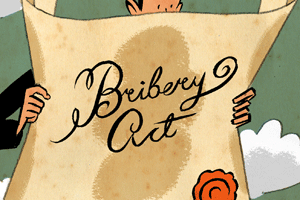
The theory that those in power were unlikely to spend time taking an axe to a major driver of private-sector enterprise proved to be bang on the money, and The Bribery Act 2010 Guidance report explicitly supports hospitality.
"Rest assured, no one wants to stop firms getting to know their clients by taking them to events like Wimbledon or the Grand
Prix," said Justice Secretary Kenneth Clarke, who put the guidance together with the Ministry of Justice, ahead of the Act’s 1 July implementation.
All is rosy then? Not quite. The government said it is happy for ‘genuine hospitality’ to go ahead, but the definition of this is still murky. Law firm Charles Russell points out that a single VIP package for ten attending the Olympics opening ceremony, with a champagne dinner and reception, costs £55,000 excluding VAT. The question is: can you call a £55,000 spend ‘genuine hospitality’? There is a chance lawyers at major brands will take the view that you cannot.
 "At what point does corporate hospitality become illegal bribery? In its preparatory work on the subject, the Law Commission tried to distinguish between which hospitality was acceptable and which was not," says Jonathan Walters, part of the Sports Group at Charles Russell.
"At what point does corporate hospitality become illegal bribery? In its preparatory work on the subject, the Law Commission tried to distinguish between which hospitality was acceptable and which was not," says Jonathan Walters, part of the Sports Group at Charles Russell.
"The results were confusing and clumsy, and were not taken forward into the legislation. Ultimately, comments coming from the corridors of power will do little to reassure hospitality providers that their businesses will survive under the new regime."
What the guidance seems to do, however, is protect low-cost corporate hospitality.
"The giving of tickets for sporting events, taking clients to dinner, offering gifts or paying travelling expenses are unlikely to fall foul of the Act," says law firm Boodle Hatfield partner Richard Beavan. "Businesses regularly engaged in this type of corporate entertaining should have nothing to fear."
Clear? It won’t be. The Act is somewhat contradictory, in that although the guidelines actively protect the corporate hospitality industry, you can still fall foul if your hospitality is considered excessive.
"What sort of corporate hospitality provision is ‘reasonable’? Clients will have
to define reasonable within their own organisation and ensure boundaries are adhered to. All corporate hospitality will have to fit into these criteria," advises René Proske, managing director of corporate hospitality group Proske Sports.
"There is such a difference between booking a seat and buffet in a marquee outside a stadium, and offering champagne and caviar in a lounge around a ten-day overseas trip. A lot depends on company budgets, which relate to the size of the business. What would be lavish for a small business may be modest for a multinational."
Proske raises the point that any legal decisions made over accusations of bribery will take into account how big a firm is. If
you are organising a corporate hospitality event for Bob and Jane’s B&B at Cartier Polo with a potential client of theirs, you might want to examine whether it crosses acceptable boundaries.
Helpfully, the Bribery Act guidelines include six ‘principles’, which, if a company adheres to them, means they will stay on the right side of any potential legal action. Because the guidelines are encased in a necessarily thick document, we’ve distilled the major points into a handy cut-out-and-keep guide for you. Essentially, if you stick to what our guidelines say, you can hopefully continue to stage corporate hospitality without the danger of a hefty legal bill.
The Bribery Act: Six principles
1. Proportionate procedures
Have written bribery prevention policies in place. Depending on the size of the business, and its exposure to possible bribery cases, the requirement to create written procedure increases. The following topics should be covered in setting out written procedure:
? Hospitality, gifts and promotional expenditure
? Direct and indirect employment, including contractors
? Enforcement, detailing discipline processes and sanctions for breaches
? Transparency of all transactions
2. Top-level commitment
An event organiser within a large organisation is unlikely, sadly, to be the top person at the firm or even on the board. However, it may be incumbent on that person to make noises so that the board is fully behind procedures to prevent bribery within the organisation. With any size business, to protect corporate hospitality the head honcho must:
? Have a written commitment to carry out business fairly and honestly
? Have procedures in place to punish
? Involve key organisation staff in bribery prevention
? Endorse all internal publications covering bribery prevention
3. Risk assessment
? Identify areas where bribery could take place
? Use resources to prevent bribery – or overspend that could be considered bribery –in areas of the business where it is most likely
? Document all risk assessment that has taken place
? Assess whether ‘bonus culture’ inadvertently promotes bribery
4. Due diligence
? Enter into all business relationships carefully and assess their impact
? Assess whether corporate hospitality is proportionate to the size of the business
? Look into the background of employees
5. Communication (including training)
? Establish staff training to highlight when corporate hospitality contravenes the Bribery Act
? Externally communicate policies through a statement or codes of conduct
? General training for new employees (depending on size of firm and how ‘at risk’ they are in their role)
6. Monitoring and review
? Review policy depending on the size of the company and how your business changes
? Remember corporate hospitality that was proportionate one year might not be in the next, depending on the size of the business
To leave a comment and let us know your thoughts.

